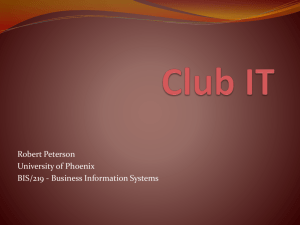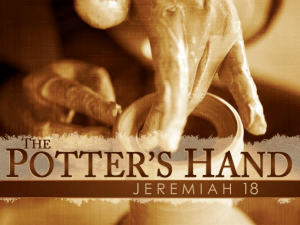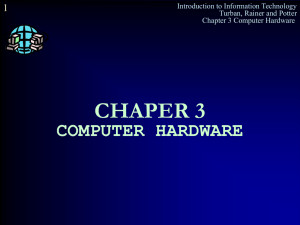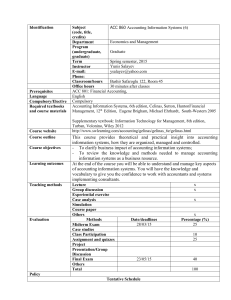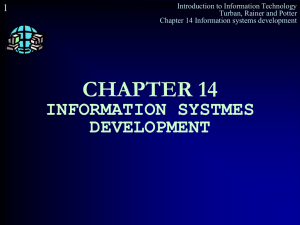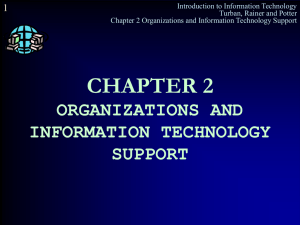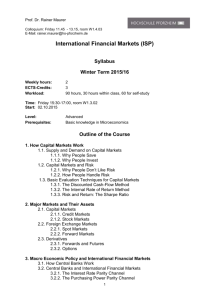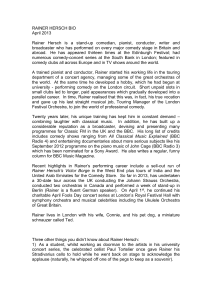chapter 9 functional and enterprise systems
advertisement
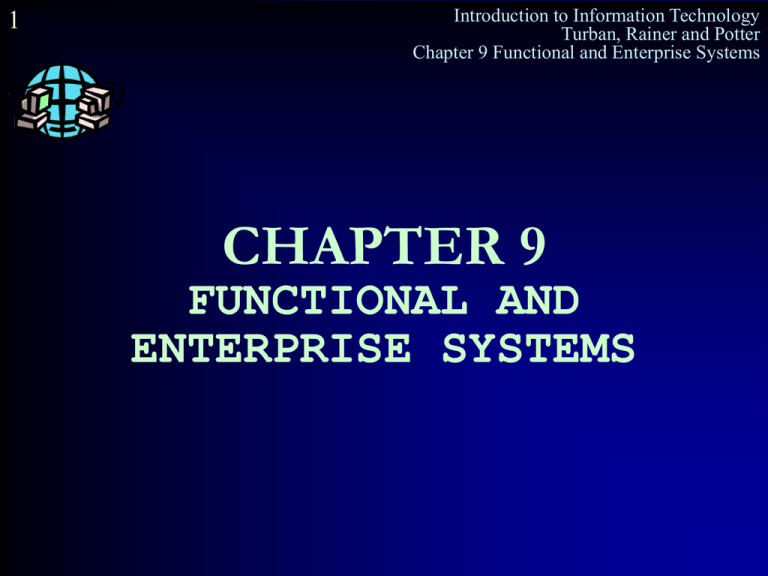
1 Introduction to Information Technology Turban, Rainer and Potter Chapter 9 Functional and Enterprise Systems CHAPTER 9 FUNCTIONAL AND ENTERPRISE SYSTEMS 2 Introduction to Information Technology Turban, Rainer and Potter Chapter 9 Functional and Enterprise Systems Learning Objectives Describe the role and characteristics of functional information systems State the objective and operations of transaction processing and how it is supported by IT Discuss the managerial and strategic applications in the accounting and finance areas that are supported by IT Understand the marketing and sales applications provided by IT Introduction to Information Technology Turban, Rainer and Potter Chapter 9 Functional and Enterprise Systems 3 Learning Objectives (continued …) List the various production and operations management activities and describe how they are supported by IT Discuss the human resources management activities and how they can be improved by IT Discuss the need for integrating functional information systems and describe the role of ERP and supported software such as SAP Introduction to Information Technology Turban, Rainer and Potter Chapter 9 Functional and Enterprise Systems 4 Chapter Overview Information Systems to Support Business Functions Transaction Processing Information Systems •Characteristic of • functional • Information • Systems •Functional Support for Managers; Management Information Systems • Tracking Business •Financial Transactions Planning and •Objectives of TPS Budgeting •The Process of TPS •Investment •Modernized TPS: Management From Online •Financial Processing to Intranet Controls •Typical TPS Tasks and Modules Accounting and Finance Systems Introduction to Information Technology Turban, Rainer and Potter Chapter 9 Functional and Enterprise Systems 5 Chapter Overview (continued …) Marketing and Sales Systems •Customer Service •Telemarketing •Distribution Channels Management •Marketing Management •Ethical and Societal Issues in IT-supported Sales Activities Human Resources Management Systems •Recruitment •HRM and Development •HRM and Planning •Intranet Applications in HRS Production and Operations Systems •Supply-Chain Management •Logistics and Materials Management •Planning Production/Operations •Automatic Design Work and Manufacturing Integrated Information Systems and Enterprise Resource Planning •Why Integrate? •How to Integrate? •Extreme Integration: Putting it All Together Introduction to Information Technology Turban, Rainer and Potter Chapter 9 Functional and Enterprise Systems 6 Case : Colonial Building Supply The Business Problem Needed a technology to monitor inventory and support-related decisions to provide it with current information about inventory levels and customer buying trends to show the price of the lumber fluctuates daily The Solution integrated system Point-of-sales (POS) terminals with hand-held automatic identification and data collection devices Introduction to Information Technology Turban, Rainer and Potter Chapter 9 Functional and Enterprise Systems 7 Case (continued…) The Results Lower costs for data entry labor Reduction in inventory and storage space Fast access to information Better customer service Higher employee satisfaction Stay competitive Increase its market share and profitability What have we learned from this case?? The system’s major applications are in logistics IT can be beneficial to a relatively small company An integration includes connection to business partners using the Internet 8 Introduction to Information Technology Turban, Rainer and Potter Chapter 9 Functional and Enterprise Systems Characteristics of Functional Information Systems Comprises of several smaller information system Specific IS applications can be integrated to form a coherent departmental function system can be completely independent can be integrated across departmental lines Interface with each other to form the organization wide information system Interface with the environment Introduction to Information Technology Turban, Rainer and Potter Chapter 9 Functional and Enterprise Systems 9 Management Information Systems Provide routine information to managers in the functional areas Provide information in exception reports and ad hoc (demand) reports Business Transactions TPS A Management Information System Databases Internal, External Data Warehouse Reports Scheduled, Exception, Demand, Others Functional applications, DSS Enterprise Application such as EIS Introduction to Information Technology Turban, Rainer and Potter Chapter 9 Functional and Enterprise Systems 10 Transaction Processing Information Systems Transaction Processing major business processes provide the mission-critical activities transaction may generate additional transaction simple transactions large volume and repetitive transactions Transaction Processing System (TPS) computerized information system supports the transaction processes 11 Introduction to Information Technology Turban, Rainer and Potter Chapter 9 Functional and Enterprise Systems Characteristics of TPS Large amounts of data are processed The sources of data are mostly internal, and the output is intended mainly for an internal audience The TPS processes information on a regular basis Large storage (database) capacity is required High processing speed is needed due to the high volume Input and output data are structured High level of detail is usually observable Low computation complexity is usually evident High level of accuracy, data integrity, and security is needed High processing reliability is required Inquiry processing is a must Introduction to Information Technology Turban, Rainer and Potter Chapter 9 Functional and Enterprise Systems 12 TPS (continued…) Customer makes a purchase of an item POS Terminal Payment Processing Transaction File Overview of typical transaction processing Queries, Answers The Items’ Processing System Master Files Inventory File Sales Files Report Introduction to Information Technology Turban, Rainer and Potter Chapter 9 Functional and Enterprise Systems 13 The Process of TPS Data are collected and entered automatically Batch Processing Online Processing Hybrid System Modernized TPS: from OLTP to the Internet Online Transaction Processing (OLTP) created on a client/server architecture can save money Internet (Intranet) transaction Processing allow multimedia data transfer, fast response time, and storage of large databases of graphics and videos Introduction to Information Technology Turban, Rainer and Potter Chapter 9 Functional and Enterprise Systems 14 Accounting & Finance Systems Financial Planning and Budgeting Financial and Economic Forecasting much of the interrelated indicators are available on the Internet many software packages conducting forecasting and planning Planning for Cash Management build a decision support model make decisions about when and how much to refinance Budgeting Budget 2000 and Comshare BudgetPlus are available to support budgeting and to facilitate communication among all participants in the preparation process Introduction to Information Technology Turban, Rainer and Potter Chapter 9 Functional and Enterprise Systems 15 Accounting & Finance Systems (continued …) Major activities STRATEGIC SYSTEMS a. Strategic Planning b. Ratios and Financial Health c. Merger and Acquisition Analysis INTERNAL ENVIRONMENT Top Management Operation/ Production Marketing HRM Engineering TACTIAL SYSTEMS a. b. c. e. g. Budgeting Preparation and Control Investment Management Capital Budgeting d. Cost Analysis and Control Tax Management f. Auditing Financial Planning OPERATIONAL AND TRANSACTION PROCESSING SYSTEMS a. c. d. e. g. The General Ledger b. Sales Order Processing Accounts Payable and Receivable Receiving and Shipping Payroll f. Inventory Management Periodical Reports & Statements EXTERNAL ENVIRONMENT IRS SEC Vendors Clients CPA Companies Suppliers Customers Business Partners Introduction to Information Technology Turban, Rainer and Potter Chapter 9 Functional and Enterprise Systems 16 Accounting & Finance Systems (continued …) Investment Management Access to financial and economic reports hundreds of sources for the financial and economic reports and news Financial analysis is executed with a spreadsheet program, or with commercially available, ready-made decision support software Introduction to Information Technology Turban, Rainer and Potter Chapter 9 Functional and Enterprise Systems 17 Accounting & Finance Systems (continued …) Financial Controls Budgetary Controls more sophisticated software attempts to tie expenditures to program accomplishment Auditing auditing software is especially suitable when computerized information systems are audited Financial Health Analysis supported by expert systems Profitability Analysis and Cost Control profitability analysis software allows accurate computation of profitability for individual products and for entire organizations Introduction to Information Technology Turban, Rainer and Potter Chapter 9 Functional and Enterprise Systems 18 Marketing & Sales Systems Distribution Channel provide the goods or services to the customer, and may extend through various intermediaries such as wholesalers and retailers Channel Systems support all marketing linkages, such as after-sales customer support Introduction to Information Technology Turban, Rainer and Potter Chapter 9 Functional and Enterprise Systems 19 Marketing & Sales Systems (continued ...) Manufacturing R & D/Design COMPANY Distribution Market Intelligence Systems Accounting/ Finance Dealer Systems CHANNEL SYSTEMS Delivery Systems Sales Systems Target Marketing Systems Customer Support Systems Introduction to Information Technology Turban, Rainer and Potter Chapter 9 Functional and Enterprise Systems 20 Marketing & Sales (continued ...) Customer Service Customer Profiles and Preference Analysis IT creates customer database and merges computerized lists Mass Customization Dell computers assembles computers according to the specifications of the buyers J.C. Penny measures you and transfers the data directly to the production floor Targeted Advertisement on the Web match appropriate ads with specific groups of customers Customer Inquiry Systems and Automated Help Desk expert systems and intelligent agents Introduction to Information Technology Turban, Rainer and Potter Chapter 9 Functional and Enterprise Systems 21 Marketing & Sales (continued ...) Telemarketing Five major activities which are supported by IT : advertisement and reaching customers order processing customer service sales support account management Distribution Channels Delivery management DSS models are used to support decisions like use own outlets or distributors, and transportation mode Improving sales at retail stores IT reduces the long lines in stores by reengineering the checkout process Introduction to Information Technology Turban, Rainer and Potter Chapter 9 Functional and Enterprise Systems 22 Marketing & Sales (continued ...) Marketing Management Pricing of Products or Services - online analytical processing is supporting pricing decisions Salesperson Productivity - sales-force automation provides salespeople in the field with portable computers, access to databases, and to the web Product-Customer Profitability Analysis - a cost-accounting system identifies profitable customers and frequency Sales Analysis and Trends - geographical information system (GIS) analyzes customers and competitors and examines potential strategies New Products, Services, and Market Planning - IT evaluates large number of factors and uncertainties and conducts survey Introduction to Information Technology Turban, Rainer and Potter Chapter 9 Functional and Enterprise Systems 23 Marketing & Sales (continued ...) Ethical and Social Issues in IT-supported Sales Activities Example of Privacy Policy : 3M Corp. Information Collection » personally identifiable information that you voluntarily provide through 3M’s website or e-mail correspondence » general information (such as the type of browser you use, the files you request, and the domain name and country from which you submit the request for information) Use of Information » responding to your inquires » tracking orders you place with 3M » supplying you with requested information on 3M products Introduction to Information Technology Turban, Rainer and Potter Chapter 9 Functional and Enterprise Systems 24 Production Operations & Logistics Supply-Chain Management (SCM) INFORMATION FLOW Transfer Supplier Transfer Manufacturing Transfer Retail Distribution SCM plans and controls the flow of information and cash Transfer Retail Outlet Consumer CASH FLOW Introduction to Information Technology Turban, Rainer and Potter Chapter 9 Functional and Enterprise Systems 25 Production Operations & Logistics (continues …) Logistics and Material Management Inventory Management determining how much inventory to keep what to order, from whom, when to order and how much inventory model : economic order quantity (EOQ) many low cost commercial inventory software packages Quality Control providing information about the quality of incoming material and parts, as well as the quality of in-process semi-finished, and finished products standard quality control information systems and expert systems Introduction to Information Technology Turban, Rainer and Potter Chapter 9 Functional and Enterprise Systems 26 Production Operations & Logistics (continues …) Planning Production/Operations Material Requirements Planning (MRP) - facilitates the plan for acquiring parts, subassemblies, or material Manufacturing Resource Planning (MRPII) - connects the regular MRP to other functional areas Just-in-Time Systems - minimizes waste of all kinds, improves processes and systems, and maintains respect for all workers Project Management - Program Evaluation and Review Technique (PERT) and Critical Path Method (CPM) Short-Term Schedules - schedule jobs and employees on a daily or weekly basis Introduction to Information Technology Turban, Rainer and Potter Chapter 9 Functional and Enterprise Systems 27 Production Operations & Logistics (Continues …) Automatic Design Work and Manufacturing Computer-Aided Design (CAD) enables drawings to be constructed on a computer screen and subsequently stored, manipulated, and updated electronically Computer-Aided Manufacturing (CAM) facilitates planning, operation, and control of production jobs Computer-Integrated Manufacturing (CIM) concept or philosophy about the implementation of various integrated computer systems in factory automation Introduction to Information Technology Turban, Rainer and Potter Chapter 9 Functional and Enterprise Systems 28 Human Resources Management Systems Recruitment finding, testing, and deciding which employees to hire Positions inventory matching open positions with available personnel allowing data to be viewed by an employee over the intranet Employee Selection conducting interviews by video teleconferencing expediting the testing and evaluation process, assuring consistency in selection by using expert systems Using the Internet advertising position openings on the Internet Introduction to Information Technology Turban, Rainer and Potter Chapter 9 Functional and Enterprise Systems 29 Human Resources Management Systems (continued …) Human Resources Maintenance and Development Training and Human Resources Development digital video-editing system - produces training videotapes Performance Evaluation online evaluations - supports many decisions, ranging from rewards to transfer to layoffs expert systems - provide an unbiased and systematic interpretation of performance over time paperless wage system (PWS) - tracks employee review dates and automatically initiates the wage review process Turnover, Tardiness, and Absenteeism Analyses DSS models - identifies causes and patterns Introduction to Information Technology Turban, Rainer and Potter Chapter 9 Functional and Enterprise Systems 30 Human Resources Management Systems (continued …) Human Resources Management and Planning Personal files and skills inventory - computerized personnel files identify qualified employees within the company for open positions, promotion, transfer, special training programs, and layoffs Benefits administration - Networks and voice technology, or the intranets, specifying the value of each benefit and the available benefits balance of each employee Government reports - Availability of computerized personnel records greatly eases the reporting process Personnel planning - IT is used to collect, update, and process the information Succession planning and implementation - expert systems and personnel databases supporting and implementing planning Labor-Management Negotiations - DSS improve the negotiation climate and considerably reduce the time needed for reaching an agreement 31 Introduction to Information Technology Turban, Rainer and Potter Chapter 9 Functional and Enterprise Systems Human Resources Management Systems (continued …) Intranet Applications in HRM Edify Corp.’s employee service system Oracle Corp.’s flexible benefits enrollment program on the intranet Aetna health Plan’s online directory of primary care physicians, hospitals, medical services, and health information Apple Computers’ extensive education and development activities on the intranet Merck Inc.’s intranet for HR transactions 32 Introduction to Information Technology Turban, Rainer and Potter Chapter 9 Functional and Enterprise Systems Integrated Information Systems Reasons for Integration using twentieth-century computer technology, which is functionally oriented : cannot give employees all the information they need do not let different departments communicate effectively with each other in the same language crucial sales, inventory, and production data often have to be painstakingly entered manually into separate computer systems every time a person who is not a member of a specific department needs ac hoc information related to the specific department 33 Introduction to Information Technology Turban, Rainer and Potter Chapter 9 Functional and Enterprise Systems How to Integrated Information Systems Connect existing systems maximize the use of existing systems and minimize the changes in them allows the addition of new applications to existing ones and the connection of systems to intranets and the Internet Using supply chain management software use one integrated package in one or several functional areas overcomes the isolation of the traditional departmental structure where the functional areas are separated from one another 34 Introduction to Information Technology Turban, Rainer and Potter Chapter 9 Functional and Enterprise Systems How to Integrated Information Systems (continued …) Enterprise resource planning (ERP) control all major business processes with a single software architecture in real time increased efficiency to improved quality, productivity, and profitability SAP software (R|3; my SAP.com) crosses functional departments and can be extended along the supply chain to both suppliers and customers composed of four major parts : accounting, manufacturing, sales and human resources Introduction to Information Technology Turban, Rainer and Potter Chapter 9 Functional and Enterprise Systems 35 ERP SAP concept Sales Offices Central SAP Database & Servers FACTORY The factory automatically receives the sales order and can begin production. WAREHOUSE The warehouse is simultaneously informed about the order and can schedule shipping. ACCOUNTING Accounting gets updated sales and production data at every step of the process HEAD QUARTERS Headquarters can tap into up-to-the-minute data on sales, inventory, and production Introduction to Information Technology Turban, Rainer and Potter Chapter 9 Functional and Enterprise Systems 36 What’s in IT for Me? For Accounting Executing TPS effectively is a major concern of any accountant For Finance The use of IT helps financial analysts and managers perform their difficult tasks better For Marketing By understanding how ERP software operates, marketing people can greatly improve the software utilization by developing challenging corporate applications 37 Introduction to Information Technology Turban, Rainer and Potter Chapter 9 Functional and Enterprise Systems What’s in IT for Me? (continued …) For Production/Operations Management Supply chain management and ERP are critical today for any medium and large manufacturing company, and for service organizations such as banks For Human Resources Management IT can improve the efficiency and effectiveness of the HRM activities conducting training on the intranet 38 Introduction to Information Technology Turban, Rainer and Potter Chapter 9 Functional and Enterprise Systems What’s in IT for Me? (continued …) For Human Resource Management Human resource managers utilize their corporate networks extensively for posting job openings, and use internal corporate networks to publish corporate policies, company newsletters and job openings
